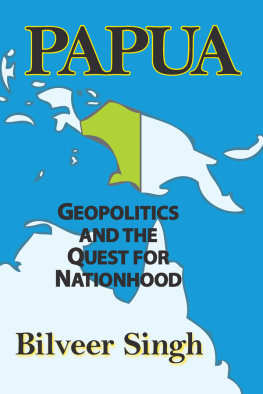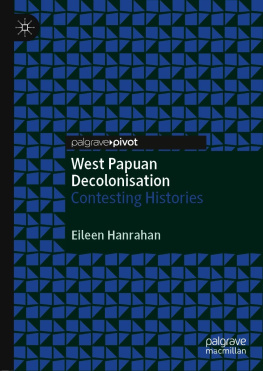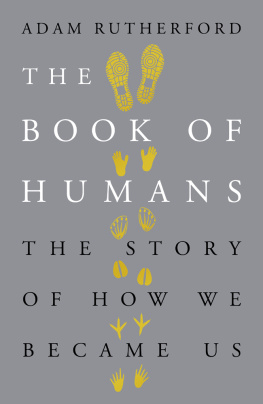DANILYN RUTHERFORD is professor of anthropology at the University of California, Santa Cruz. She is also the author of Raiding the Land of the Foreigners: The Limits of the Nation on an Indonesian Frontier (Princeton University Press, 2003).
The University of Chicago Press, Chicago 60637
The University of Chicago Press, Ltd., London
2012 by The University of Chicago
All rights reserved. Published 2012.
Printed in the United States of America
21 20 19 18 17 16 15 14 13 12 1 2 3 4 5
ISBN-13: 978-0-226-73197-1 (cloth)
ISBN-13: 978-0-226-73198-8 (paper)
ISBN-10: 0-226-73197-9 (cloth)
ISBN-10: 0-226-73198-7 (paper)
ISBN-13: 978-0-226-73199-5 (e-book)
Library of Congress Cataloging-in-Publication Data
Rutherford, Danilyn.
Laughing at Leviathan : sovereignty and audience in West Papua / Danilyn Rutherford.
p. cm. (Chicago studies in practices of meaning)
ISBN-13: 978-0-226-73197-1 (cloth : alk. paper)
ISBN-13: 978-0-226-73198-8 (pbk. : alk. paper)
ISBN-10: 0-226-73197-9 (cloth : alk. paper)
ISBN-10: 0-226-73198-7 (pbk. : alk. paper) 1. Papua (Indonesia)Politics and government. 2. Sovereignty. 3. Hobbes, Thomas, 15881679. Leviathan. I. Title. II. Series: Chicago studies in practices of meaning.
DU744.5.R88 2012
995.1dc23
2011028476

This paper meets the requirements of ANSI/NISO Z39.48-1992 (Permanence of Paper).
CHICAGO STUDIES IN PRACTICES OF MEANING
Edited by Jean Comaroff, Andreas Glaeser, William H. Sewell Jr., and Lisa Wedeen
Also in the series
The Genealogical Science: The Search for Jewish Origins and the Politics of Epistemology
by Nadia Abu El-Haj
Neoliberal Frontiers: An Ethnography of Sovereignty in West Africa
by Brenda Chalfin
Ethnicity, Inc.
by John L. Comaroff and Jean Comaroff
Inclusion: The Politics of Difference in Medical Research
by Steven Epstein
Political Epistemics: The Secret Police, the Opposition, and the End of East German Socialism
by Andreas Glaeser
Producing India: From Colonial Economy to National Space
by Manu Goswami
Bengal in Global Concept History: Culturalism in the Age of Capital
by Andrew Sartori
Parit! Sexual Equality and the Crisis of French Universalism
by Joan Wallach Scott
Logics of History: Social Theory and Social Transformation
by William H. Sewell Jr.
Bewitching Development: Witchcraft and the Reinvention of Development in Neoliberal Kenya
by James Howard Smith
The Devils Handwriting: Precoloniality and the German Colonial State in Qingdao, Samoa, and Southwest Africa
by George Steinmetz
Peripheral Visions: Publics, Power, and Performance in Yemen
by Lisa Wedeen
Preface and Acknowledgments
In his wise, witty, magisterial, and depressing book on the history of the conflict between the Netherlands and Indonesia over western New Guinea, the historian Pieter Drooglever (2009) describes the following incident. The year is 1960, and the conflict is coming to a head. Leaders in the US State Department have hesitated to confirm publicly the vague promises some administration officials have made to help defend Netherlands New Guinea in the event of an Indonesian invasion, although at least one of their Dutch counterparts is wishfully acting as if they had. Indonesias charismatic first president, Sukarno, a champion of the nonaligned movement, is playing Cold War superpowers off of one another, reinforcing the Indonesian military with both American and Soviet arms. Even Australia, New Guineas other colonizer, is softening its support for the Netherlands. The Dutch foreign minister and the diplomats negotiating in Washington are calling for restraint, while the governor of Netherlands New Guinea is calling for protection in the form of fighter planes and troops.
Dutch leaders know they cannot defend Netherlands New Guinea (and maintain their commitments to NATO) without outside aid. But they also know that the international community neither accepts nor really understands why the Netherlands is wasting so much breath on the primitive territory at a time when colonialism is going out of fashion. American policymakers need to know that their Dutch counterparts trust their assurances, but they also need to know that the Netherlands will fight to keep the colony if push comes to shove. And so Dutch leaders decide to send the showcase of their navy, the aircraft carrier Karel Doorman, on a voyage to Dutch New Guinea intended, as Drooglever puts it, to show their teeth and show the flag (2009, 384).
The Karel Doorman sets out from Rotterdam in late May with two submarine chasers, a cargo of fighter jets, and an oil tanker for refueling. The trip does not go well. Indonesia breaks diplomatic ties with the Netherlands upon learning of the scheme. Uneasy about the consequences of appearing to support the Dutch, the government in Madagascar cancels a planned visit. The stevedores union in Fremantle, Australia, where the Karel Doorman is scheduled to dock, refuses to provide tugboat assistance. Only by using the fighter jets engines to create lateral thrust is the crew able to maneuver the aircraft carrier into its berth. After a brief respite in New Guinea, the squadron heads north toward Japan, where the Dutch have arranged for a fleet visit to celebrate the 350th anniversary of Dutch-Japanese relations. Indonesia pressures the Japanese government, and the trade unions in Yokohama threaten to use force to prevent the ships from mooring. The fleet visit? Canceled. The squadron turns back to New Guinea then sails home via Cape Horn, calling at New Caledonia, Australia, Chile, and Brazil on the way. The Karel Doorman reaches Rotterdam in late December, nearly seven months after setting out.
This tale comes midway through Drooglevers exhaustive study, which the Netherlands Ministry of Foreign Affairs commissioned in 2000 to provide sound information on the subject [of the decolonization of western New Guinea and the Papuans right to self-determination] to a wide audience (Drooglever 2008, 7). It appears in the midst of a detailed account of the twists and turns of what Drooglever calls the dispute in international perspective (Drooglever 2009, 310). Drooglever tells us of dealings within and among the various governments with a stake in the conflict, their representatives constant effort to save face and save their jobs, the circulation of their utterances across genres and contexts, and the strategies they used to make one another perceive their respective countries interests and animosities as the same. All this unfolded without the participation of western New Guineas inhabitants, the putative beneficiaries of all this maneuvering, who were then known as Papuans, as they are again today. Even those caught up in what some Papuans called gila kedaulatan, sovereignty madness, found themselves excluded from the negotiations that were sealing their fate (Drooglever 2009, 540). Drooglevers description of this Cold Warera game of image management should have prepared me to see the voyage of the













 This paper meets the requirements of ANSI/NISO Z39.48-1992 (Permanence of Paper).
This paper meets the requirements of ANSI/NISO Z39.48-1992 (Permanence of Paper).